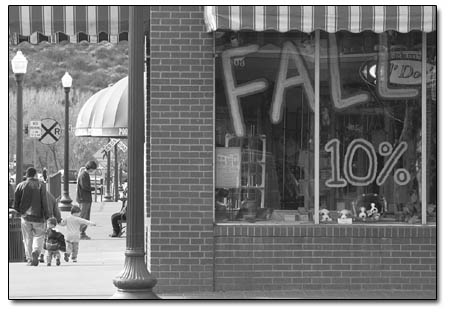 |
| Pedestrians stroll the streets
of Durango’s Central Business District earlier this
week. Property owners in the district are being asked to
vote on a $150,000 tax increase to help fund tourism and
special events promotion./Photo by Todd Newcomer. |
As voters ponder a relatively sleepy Nov. 4, mail-in ballot,
business owners and residents of the Durango Central Business
District will be asked whether or not to resurrect an increase
in the district’s property tax to help boost stagnant
tourism.
The referred measure comes from the Durango Conference Center
Business Improvement District, a group that formed seven years
ago after a successful similar vote. In that case, the measure
called for an identical increase in property tax to cover the
cost of bringing a tourist-attracting conference center to downtown.
Three years ago, the term of the tax expired.
The new measure calls for a total increase of roughly $150,000
a year in property tax collected within the Central Business
District, an area stretching from Fifth to 15th streets and
bounded by Camino del Rio and E. Second Avenue. Select, service-oriented
businesses along North Main Avenue also are considered part
of the district. For these property owners, the increase would
translate into an additional $88 per year per $200,000 of assessed
value. The money would be spent on event marketing, event coordination
and possible capital improvements to draw more tourist dollars
into downtown Durango.
John Wells, a board member of the district, noted, “The
ability to raise between $140,000 and $150,000 for marketing
special events could be quite impactful for the community.”
Wells explained that the board would manage the funds by responding
to requests from existing or new local events to market outside
the community. He argued that with extensive advertising of
local happenings, Durango’s tourism industry could be
revived.
“Visitor numbers have been stagnant for a few years,”
he said. “The idea is that the Durango Area Tourism Office
already does tourism marketing and this would be targeted toward
marketing new and existing events.”
Wells believes that $88 per $200,000 of assessed value is not
a dramatic increase.
“We think it’s a reasonable amount of additional
tax to pay,” he said. “We believe that the amount
would be more than off-set by the amount of benefit.”
Wells also explained that the measure is not tied to the City
of Durango’s recent hire of Bob Kunkel as the Central
Business District events and promotion specialist.
No formal objections to the referred measure have surfaced
as of yet. However, several local business owners expressed
“off-the-record” concerns about the measure. First,
there are concerns about what happened to the original pool
tax collected for the conference center, which was never built.
Wells noted that a portion of it was spent on a feasibility
study that determined such a conference center would not be
economically viable. As the Business Improvement District has
shifted gears toward event promotion, a portion of the funding
also has been spent on outside advertising of the Iron Horse
Bicycle Classic, the Rocky Mountain Runners’ Festival
and Colorfest, as well as other events.
Another chunk has been spent on testing the feasibility of
such an events-marketing program with serious analysis of other
resort communities’ efforts. However, Wells noted that
the vast majority of the money remains in the bank.
“We’ve been pretty frugal with it,” he said.
Another charge was that the board has operated behind a veil
of secrecy, to which Wells replied that the district meets monthly
and the meetings are open to the public.
An additional “off-the-record” comment was that
such a tax to encourage tourism would only benefit local retail,
lodging and restaurants, even though businesses and residents
throughout the central business district would be taxed. Wells’
response was that the pool of dollars throughout Durango would
grow and change hands several times in the community. “It’s
easy to see the benefits when you look at retail or lodging
or restaurants,” he said. “But there’s also
a ripple effect that would help people in other areas of business
throughout the community.”
The people who would be directly impacted by the tax increase
are also the ones who will decide whether it passes or fails,
according to Lisa Lieb, election official for the Business Improvement
District. Eligible electors are required to be 18 years old,
Colorado residents and own a primary dwelling or business property
or have leasehold interest within the district. Lieb noted that
the election will be held at Durango City Hall between 7 a.m.
and 7 p.m. on Tuesday, Nov. 4.
People interested in obtaining an absentee ballot have until
Friday, Oct. 31, to do so. Lieb said that qualified electors
should have been notified by mail, but anyone with doubts or
interest in an absentee ballot can contact her at 759-4564.
Wells remarked in closing that the ultimate decision on the
tax increase is in the hands of those who would have to pay
it. “Certainly we encourage everyone to exercise their
right to vote,” he said.

